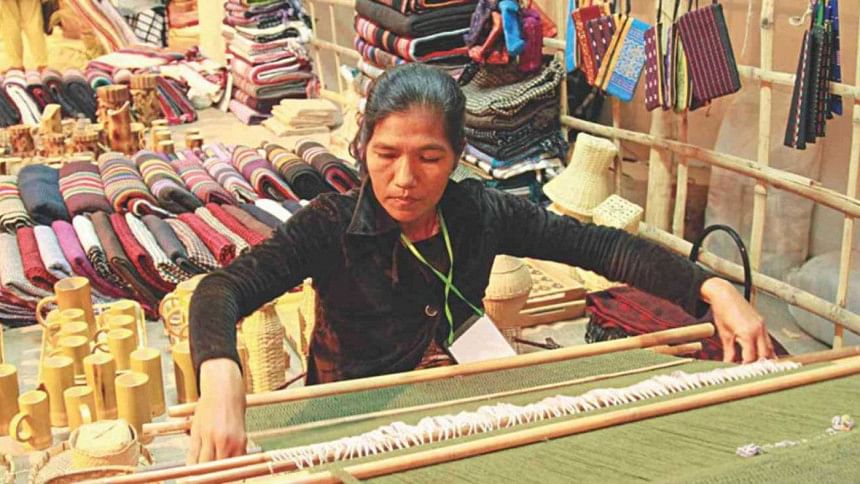The Paradoxes of the Bangladesh miracle

Ravaged periodically by natural calamities, long dependent on foreign aid and remittances, and a perennial source of refugees and emigrants, Bangladesh was once "a basket case of misery," as Zia Haider Rahman put it in his great debut novel, In the Light of What We Know. But on the 50th anniversary of its independence, Bangladesh is fast becoming a development paragon—a Miracle on the Meghna.
Among the country's achievements is a dramatic improvement in its citizens' average standard of living. According to the most recent data from the International Monetary Fund, Bangladesh's per capita GDP (measured in purchasing-power-parity terms) was about half of Pakistan's in 1987 and two-thirds of India's as recently as 2007. But in 2020, Bangladesh has surpassed the former and is catching up with the latter, owing partly to its success in becoming a leading textiles and clothing exporter, trailing just behind China and Vietnam.
Even more noteworthy are the improvements in social indicators such as life expectancy, infant and maternal mortality, fertility, and female labour-force participation. And, equally important, Bangladesh has managed to sustain a modicum of democratic stability—keeping the army in the barracks.
But beyond such metrics, Bangladesh's experience is distinctive in two ways that have yet to be fully appreciated from a broader development perspective. The first relates to state formation and capacity. The defining characteristic of the modern state is that it holds a monopoly on legitimate violence, legitimate extortion (namely, taxation), and the provision of essential services. The second monopoly serves the objective of the third, and even when the state does not provide services directly, it dictates the terms.
In Bangladesh, however, the state has voluntarily ceded the service-provision monopoly to the nongovernmental sector. BRAC and a number of other now-famous NGOs have played a major role in providing healthcare, schools, and financial services, and in leading public-health campaigns to deliver oral rehydration therapy and immunisation. Despite the NGO sector's outsize presence, Bangladeshi leaders have not perceived its activities as a usurpation of the state's authority.
As such, Bangladesh offers a fascinating study in political economy. Normally, democratic states aim to ensure popular support by providing the services that citizens need. Most are loath to cede that function lest they lose power and legitimacy (not to mention opportunities for rent-seeking and corruption). The more effective that non-state actors become in delivering services, the more threatened most states feel. But Bangladesh has escaped this dynamic.
A partial explanation is that Bangladesh was so poor and lacking in state capacity in its early years that public service delivery suffered, creating a vacuum for other actors to fill. Those who seized the opportunity then enjoyed access to vast inflows of foreign aid, which averaged (in net terms) five percent of GDP for 25 years until the turn of the century.
But deeper factors could also be at play. Given that Bangladesh has a relatively low tax-to-GDP ratio of less than 10 percent, one can infer that the state implicitly chose to cede its monopoly on service provision to avoid exercising the politically costlier monopoly of taxation. So, while Pakistan is seen as a failing state, and India as a "flailing state," Bangladesh is a fledgling state, though more effective than its South Asian neighbours.
The other distinctive feature in Bangladesh's development is its export performance. The fact that its success in manufacturing contributed in turn to greater education and agency for Bangladeshi women has been well documented by the economists Rachel Heath and A Mushfiq Mobarak. Less appreciated is the paradox that lies at the heart of this export success.
As my research with Raghuram G Rajan of the University of Chicago has shown, export sectors historically have fared relatively poorly in developing countries that received a lot of aid, suggesting the work of an "aid curse"—a variant of the natural-resource curse. Foreign aid, no less than an abundance of oil and gas, tends to make the real exchange rate too strong, rendering export sectors uncompetitive. But Bangladesh has bucked the trend again.
Beyond luck and chance, additional factors that may have contributed to Bangladesh's export success include plentiful labour, which kept dollar wages low enough to offset an exchange rate kept too strong by foreign aid and remittances; and preferential trade access to foreign markets, first under the Multi-Fiber Agreement (until it was abolished), and then under programmes established by the United States and the European Union.
Looking ahead, low-lying Bangladesh, of course, faces a serious climate change challenge, but its ability to sustain its economic transformation will depend on how these two distinctive features evolve. If non-state actors enter politics, they could upset the current equilibrium, prompting the state to reappropriate its monopoly on service provision. Were that to happen, the state would almost certainly have to increase taxes to show that it can be as effective as the NGOs.
Similarly, Bangladesh's export competitiveness could be undermined by rising wages, the enforcement of cost-increasing labour standards and regulations, and the loss of preferential export access in rich markets.
Bangladesh was carved out of India in 1947 on religious grounds and then broke away from Pakistan in 1971 on linguistic and cultural grounds. For decades, it was an object of condescension for India and Pakistan alike. Not anymore. Now a shining model of development, this twice-dismembered country offers lessons for the struggling countries from which it was born.
Arvind Subramanian, a former chief economic adviser to the government of India, is the author of Eclipse: Living in the Shadow of China's Economic Dominance.
Copyright: Project Syndicate, 2021.
www.project-syndicate.org
(Exclusive to The Daily Star)

 For all latest news, follow The Daily Star's Google News channel.
For all latest news, follow The Daily Star's Google News channel. 



Comments